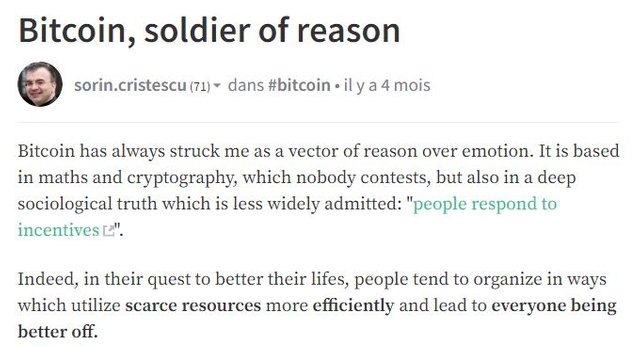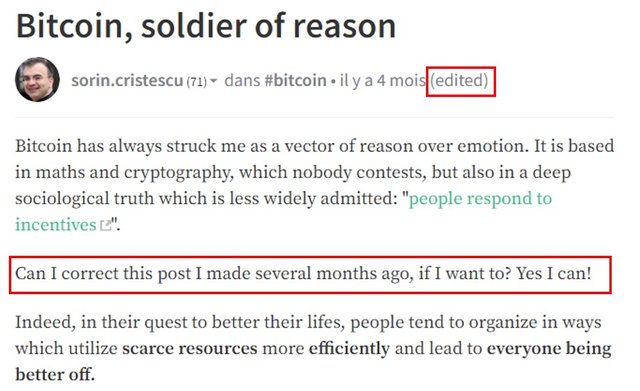Is blockchain a "record keeping device", a "truth machine" or what?
Twitter: good, bad and ugly all in one
Twitter is such a pernicious media ... it forces people into expressing complex realities in very few words, thus distorting them and leading to misunderstandings and needless quarrels.
Complex things are hard to express meaningfully even when using lots of words. But when one is strongly corralled into using few words (as Twitter does), it becomes orders of magnitude harder.
Besides, we are by nature rather lazy and inclined to take shortcuts and use "System 1" far more often than we should.
So here we have someone who's a well-regarded contributor to the platform, tweeting

"Blockchain" ... by now, this generic term has been so overused that it became blurred. As a side note, it also became an almost perfect "twitter word" because it's a "large bag" full of different meanings, enabling people to fight over various topics, never needing to admit being wrong.
"Blockchain cannot be the answer" ... that is a very interesting statement I feel like exploring ... but it would be such a pain to do it on Twitter ! So here I am ...
Can "blockchain" be "the answer"?
This is a complex topic. The question at least is relatively clear: "how to create an informed public under conditions of abundance [of information, presumably]?
"Blockchain", if you ask me, is first and foremost a software architecture pattern. Since bitcoin in 2008, it has received many different implementations. Code is infinitely versatile, so there are many different applications using the "blockchain" architecture pattern in vastly different ways.
Anyway, being simply a software architecture pattern, "blockchain" clearly cannot be "the answer" to ... (almost) anything. Saying "blockchain cannot be the answer to [insert any user need here]" is stating the obvious and basically a waste of energy ...
But of course the tweet can be read differently. It is quite likely that what Frances meant is rather:
"Current applications implementing the blockchain pattern cannot answer that need"
... which is a more informing and interesting statement ... but makes for a horrible tweet! Yes, Twitter encourages us to dumb down the conversations ...
Or perhaps, she might have meant something even more ambitious:
"The blockchain pattern cannot be of any significant help to an application trying to answer that need
I cannot know what "blockchain applications" Frances has in mind when she states that they cannot answer that need. However, it's fair to guess that she thinks of applications built on top of bitcoin or ethereum, two blockchains which have not been designed with the goal of "storing curated information" in mind.
I'll look at both these possible interpretations starting with the first and considering as "current applications" two which readers probably know much better than Frances does: Steemit.com, which uses the steem blockchain, and Hive.blog using the sibling hive blockchain.
Why these? Well, because their design goal approaches very much the one Frances is discussing in her tweet: the need to create an informed public.
Alternative facts
"Alternative facts" can in general reach the steem and hive blockchains as easily as real facts ... at least at first.
However, both Steemit.com, Hive.blog as well as peakd.com and other front-ends to these blockchains allow poor content to be "downvoted". Downvoted content becomes less visible and has a harder time reaching a large audience. So yes, "alternative facts" might keep reaching the blockchain (in the current implementations of the front-ends), but once marked as such their audience decreases.
Besides, both Steemit.com and Hive.blog users have a "reputation" score. If a user keeps inputting "alternative facts" which get downvoted, his reputation may suffer to the point where none of his posts is displayed anymore! Below an example of content produced by a user with a negative reputation, which is therefore hidden:
The implementation of the "reputation" attribute is still open to debate and might potentially be improved. In the exemple above, a user can redeem himself and once his reputation gets back above 0 his past content becomes visible again, provided it has not been specifically marked as "alternative facts" by the above mechanism of "downvoting".
Thus it can be said that, while "alternative facts can be put on the steem and hive blockchains just as easily as real facts" (public permissionless, "no censorship"-credo obliging), these blockchain-based applications go a long way already in allowing curators to inform the public with real, rather than alternative facts.
Removed or corrected
Can "alternative facts" be removed or corrected on Steemit.com, Hive.blog and other such applications?
I'd first say that "removing" would be a very bad idea for so many reasons. First of all, there are very few (if any) "absolute truths". One should not forget that even "real facts" reach the blockchain not as "facts" but as they are "put into words by someone" - and there's always more than one way to express a fact in words. Second, for many reasons, it's important to be able to keep track of "who said what when", to keep a log or a journal. Allowing the "removal" of "alternative facts" would also allow a serial offender to claim that he "never said such things".
But both Steemit.com, Hive.blog and all the other front-end applications to the steem and hive blockchains allow "corrections", as illustrated below with my previous Steemit article from 4 month ago.
My original post
Contrary to what Frances seems to imply, "blockchain" allows "alternative facts" to be corrected
And here is the blockchain transaction as displayed on steemworld.org, block 58998798, TxId 9e1ac79a9d2ec700bfa8e2fd0af1d844e46abead
Yes, the "alternative fact" remains on the blockchain (and that is just as well), but once corrected, only "blockchain forensics" can see it, while regular users are shown the corrected "real fact".
An important thing to point out: as transactions on both steem and hive are free (yet accounted for through a complex "resource credits" and "power" system), "downvoting" and correcting an "alternative fact" didn't cost me any crypto (though they had a non-monetary cost so as to prevent irresponsible behaviour / spam).
So, what do you think, can a current blockchain-based application answer the need of creating an informed public?
I'd say the answer could be a qualified "yes". Why "qualified"? Because it's not as much about the application as about the behaviour of its users. The key thus lies in the crypto-economics of the blockchain-based application: one needs to design a system with incentive compatibility.
But this makes even easier to answer the second potential interpretation of Frances's tweet:
"Can the blockchain pattern offer significant help in creating an even better application fulfilling the need of creating an informed public?"
I'd say it's rather hard to claim the opposite ...



